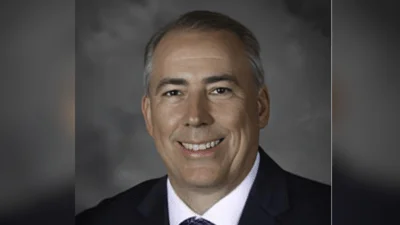Mayor Mike Duggan | City of Detroit Michigan Official website
Mayor Mike Duggan | City of Detroit Michigan Official website
Detroit joined a growing number of cities, counties, and states in the U.S. that have adopted a mandatory energy and water benchmarking and transparency policy for buildings. This policy requires property owners to track and disclose a buildings’ annual energy and water usage and was unanimously adopted by Detroit City Council on Tuesday. More than 50 U.S. cities and states – such as Chicago, Saint Paul, Columbus, Indianapolis, Minneapolis, Ann Arbor – have adopted similar policies as a key step to curb their GHG emissions.
Beginning in 2024, the ordinance requires all municipal buildings, as well as commercial and multi-family buildings over 100,000 GSF, to annually report their aggregate energy and water usage data to the City of Detroit. Data for the 2023 calendar year is due by October 1, 2024, with subsequent annual data due by June 1st of each following year. Commercial and multifamily buildings between 25,000 GSF and 100,000 GSF are required to start reporting their energy and water usage data for the previous calendar year on June 1, 2025.
“I am proud to have supported this ordinance, which was initiated by Detroit’s Green Task Force, that will require certain businesses to provide the city with information on their energy and water usage,” said City Councilman Scott Benson. “To reduce greenhouse gas emissions, we need to come up with solutions driven by data, not best guesses. This ordinance, along with other key strategies in the Detroit Climate Strategy, makes our city a leader in sustainability.”
Buildings are the largest source of greenhouse gas (GHG) emissions in Detroit, representing 63% of GHG emissions in 2018. On average, benchmarking a building’s energy and water usage reduces consumption. This leads to reduced operating costs and GHG emissions, and increased savings for owners and tenants. This ordinance is a critical tool to help monitor the energy and water consumption of Detroit’s municipal buildings and to help the City identify opportunities for efficiency upgrades that advance Detroit’s overall sustainability goals. The City will provide free resources to support benchmarking for private property owners covered by the ordinance.
The adoption of the ordinance follows extensive efforts initiated in 2020 by the Energy Waste Reduction (EWR) Committee of the Detroit City Council Green Task Force, led by Ben Dueweke and Kendal Kuneman. The process involved extensive collaboration with and input from various stakeholders, with a focus on incorporating equity into benchmarking efforts. The Green Task Force, overseen by Councilman Scott Benson and Senior Policy Analyst Kerwin Wimberly, comprises seven committees providing sustainability advisory support to Detroit City Council.
In addition to learning from experiences in other cities that have adopted benchmarking policies, Detroit’s policy builds on efforts already underway in the city, including a voluntary benchmarking program facilitated by the Detroit 2030 District. This program recognizes buildings that track and disclose their energy and water use and have improved their energy efficiency through an annual awards ceremony.
Detroit Climate Strategy
The new benchmarking policy is one of the key actions in the newly launched Detroit Climate Strategy, which was released by the City’s Office of Sustainability today. The Strategy outlines concrete, near-term actions the City and its partners will take to accelerate the fight against climate change, provide benefits to Detroiters, and put the City on a pathway to reduce its municipal GHG emissions by 75% by 2034 and by 100% by 2050. The Detroit Climate Strategy includes actions, each with 3-year milestones, around four strategies: transition Detroit’s energy supply to clean energy; increase access to sustainable mobility options; accelerate energy efficiency and reduce waste; and help communities, with a focus on our most vulnerable residents, adapt to a changing climate. The development of the strategy was made possible by the generous support from the Kresge Foundation. See the full Detroit Climate Strategy www.detroitmi.gov/climatestrategy .
“The Detroit Climate Strategy is an essential roadmap for the City to achieve our climate goals and ensure a vibrant and healthy city for all residents. We can, and we must, simultaneously reduce our greenhouse gas emissions and address the critical day-to-day challenges facing Detroiters. Adopting energy and water benchmarking requirements is a necessary next step to help Detroit advance its ambitions as a leading city in Michigan and in the country,” said Jack Akinlosotu, Director of the Office of Sustainability.
The Detroit Climate Strategy was shaped by the Climate Equity Action Council, with extensive community input over two years, including six focus group sessions and three town hall meetings. Development of the Strategy was led by the Office of Sustainability, in close coordination with 14 City departments and offices, who are responsible for implementing different aspects of the Strategy.
“A lot of the Detroit Climate Strategy goals relate to what is needed in my Southwest Detroit community: educating the public, making energy more affordable, improving air quality, creating green spaces to offset flooding and basement backups, and helping residents rebound after such events,” said Theresa Landrum, Climate Equity Action Council (CEAC) member and community advocate and activist in the environmental justice movement in Southwest Detroit.
“The Detroit Climate Strategy is laser focused on the near-term, concrete actions that will help Detroiters today and put the city on a pathway to meet its climate goals. The actions in the Strategy are examples of how Mayor Duggan is tackling the climate crisis and delivering on urgent priorities for residents – charting a model for other cities to follow,” said Adam Freed, Sustainability Principal at Bloomberg Associates, the pro bono consulting arm of Bloomberg Philanthropies, which supported the development of the Strategy.
“The Detroit Climate Strategy is a blueprint for change, a testament to our city's ability to adapt, and a testament to our commitment to creating a better world for generations to come. Together, we will turn challenges into opportunities, and with every sustainable action we take, we'll build a brighter future for all Detroiters,” said Briana DuBose, Director of Strategic Community Initiatives, EcoWorks.
"I’m excited to implement the actions in the Detroit Climate Strategy, which will deliver better services for residents, strengthen our neighborhoods, reduce our greenhouse gas emissions, and protect our most vulnerable residents from the effects of climate change. We are already forging ahead by investing in solar energy and electric vehicle infrastructure, retrofitting City buildings to increase their energy efficiency, and planting thousands of trees." said Crystal Perkins, Director of the General Services Department, City of Detroit.
Original source can be found here.


 Alerts Sign-up
Alerts Sign-up